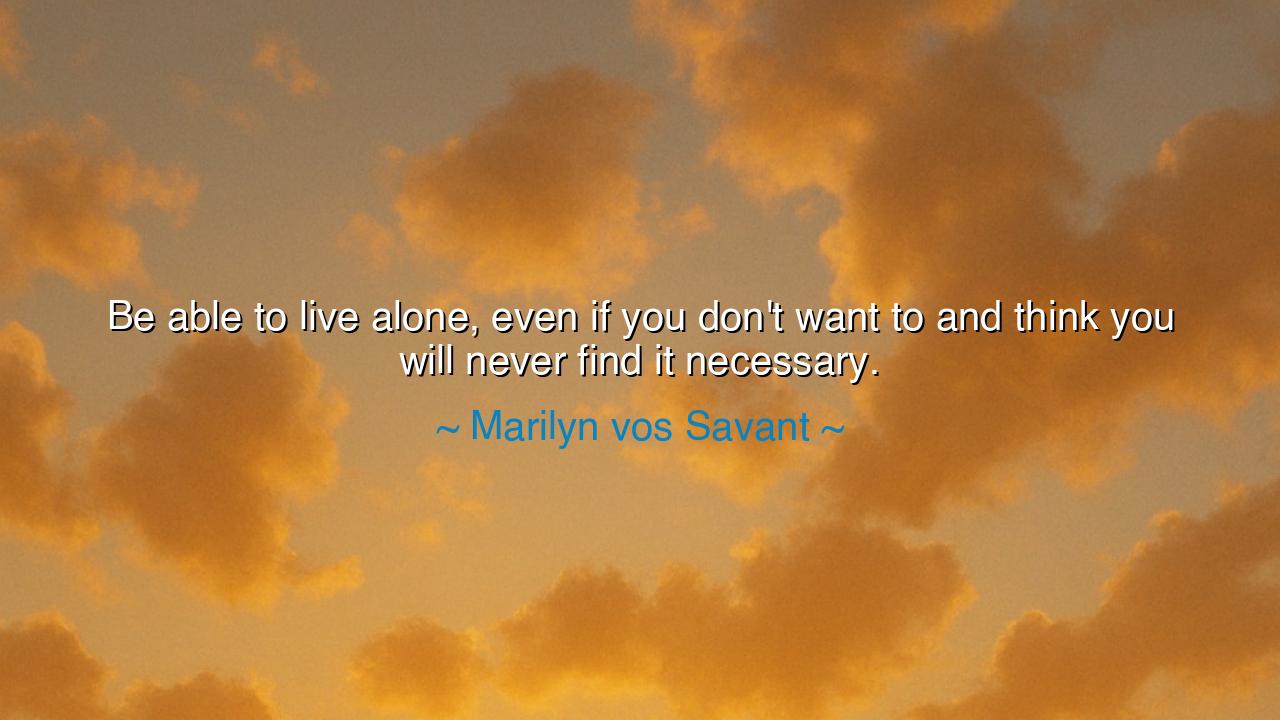
Be able to live alone, even if you don't want to and think you
Be able to live alone, even if you don't want to and think you will never find it necessary.






The words of Marilyn vos Savant — “Be able to live alone, even if you don't want to and think you will never find it necessary” — shine like a quiet lantern in the vast corridors of human life. They are not a call to isolation, but a hymn to self-sufficiency, to the noble art of standing firm within one’s own spirit. In every age, men and women have sought companionship, community, and love. Yet beneath these longings lies a truth older than civilization itself: before one can truly share life with others, one must first learn to live with oneself.
To live alone is not merely to dwell in solitude, but to discover the strength and serenity that rise from one’s own soul. It is a test of courage, for solitude strips away the masks we wear before the world. In the silence of being alone, we meet ourselves — our fears, our dreams, our weaknesses, our hidden desires. Many flee this encounter, fearing the voice of their own heart. But the wise do not flee; they listen. They learn to build a friendship with their own mind, to find company in thought, purpose, and inner peace. This, vos Savant teaches us, is not just a skill — it is a power.
Consider the story of Marcus Aurelius, emperor of Rome and philosopher of the Stoics. Though he ruled a vast empire, his truest kingdom was within. Amid war, betrayal, and loss, he wrote in solitude the meditations that would outlast his reign. In his journals, he taught himself — and us — that one must be self-contained, able to stand amid storms without leaning too heavily upon the fleeting comforts of others. Marcus knew loneliness well, yet through it, he found clarity. His solitude was not despair, but discipline; not absence, but awakening.
Vos Savant’s words arise from this same lineage of wisdom. They remind us that the world can change swiftly — that companions may depart, fortunes may crumble, and the familiar may fade. If one has never learned to live alone, then such losses become unbearable. But if one has cultivated the inner garden of independence, then even in loss, one finds sustenance. To be able to live alone — even if you never must — is to carry an invisible shield, forged from understanding who you are and what you can endure.
In this teaching lies a paradox: only the one who can live alone is truly free to love without fear. Dependency breeds anxiety, but self-sufficiency breeds freedom. When you no longer need others to complete you, you can cherish them without grasping, love them without chains. Your affection becomes a gift, not a hunger. Your presence becomes peaceful, not possessive. Thus, learning solitude is not the rejection of love, but its purification.
Think, too, of Nelson Mandela, who spent 27 years imprisoned in isolation, separated from all he loved. In that long solitude, he learned to govern not nations, but himself. When he emerged, it was not with bitterness, but with vision. His years alone became his furnace — refining his patience, deepening his empathy, hardening his resolve. Mandela’s greatness was born in silence. From his solitude, he built a new nation. And so, his life proves that solitude, when embraced with purpose, can shape one into something unbreakable.
Let the lesson, then, be clear: learn to live alone before life teaches you how. Practice the art of solitude — not as retreat, but as refinement. Sit with yourself without distraction. Walk without needing company. Learn to comfort yourself in sorrow, to motivate yourself in struggle, to find joy without witness. These are not acts of loneliness, but of liberation.
And when you master this art, you will carry a light that cannot be extinguished by the absence of others. You will move through the world with quiet confidence, able to give freely because you no longer fear being left empty. For in the end, the one who knows how to live alone is the one who is never truly alone — for they walk in harmony with the eternal companion: their own soul.






AAdministratorAdministrator
Welcome, honored guests. Please leave a comment, we will respond soon